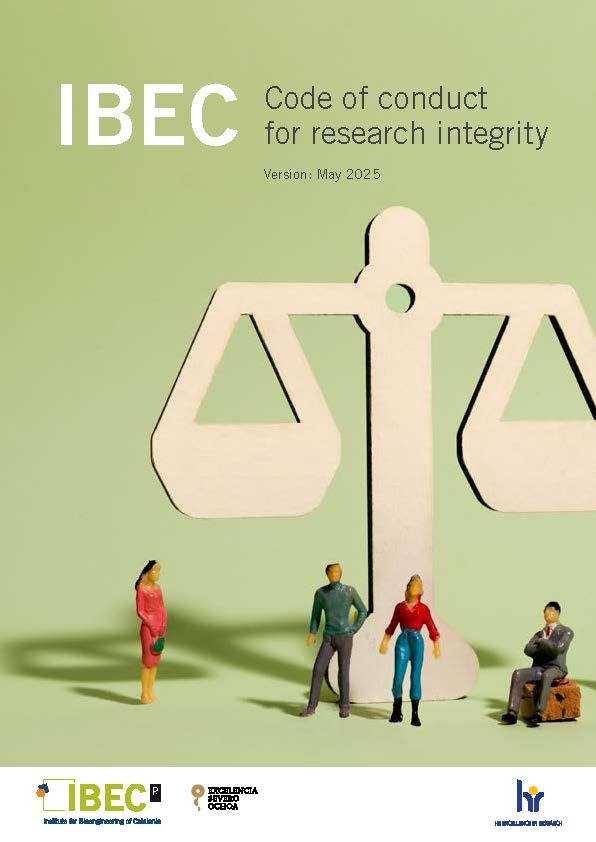Codi de conducta per la Integritat de la Recerca
El Codi de conducta de l’IBEC per a la Integritat de la Recerca (el Codi) és una de les accions dins del marc de l’Estratègia de Recursos Humans per a Investigadors (HRS4R) segons el Charter & Code Europeu.

El Codi és un marc per a les bones pràctiques de recerca, que estableix els criteris per a un comportament de recerca adequat i crea un entorn propici per a una recerca d’alta qualitat, garantint així que la recerca es duu a terme d’acord amb els estàndards ètics internacionals.
El Codi complementa les polítiques i els procediments de l’IBEC, com ara els de salut i seguretat, condicions laborals i propietat intel·lectual, i no els substitueix. El seu contingut és complementari a les lleis vigents.
Juntament amb la promoció del Codi, l’IBEC vol adoptar un paper proactiu proporcionant formació als investigadors en aquest sentit al llarg de les seves carreres i sensibilitzant sobre el tema, evitant així problemes futurs.
El Codi estableix els estàndards ètics i les normes de conducta de recerca i estableix principis, recomanacions i compromisos. En deixar clara la conducta que s’espera i es considera eficaç, el Codi contribueix a una atmosfera d’obertura.
La versió més actualitzada del Codi es pot accedir aquí.
El Codi s’aplica a tots els professionals vinculats a l’IBEC i ha de ser conegut per aquests en totes les etapes de la seva carrera, així que llegiu-lo atentament.
Comissió per a la Integritat de la Recerca de l'IBEC
La Comissió per a la Integritat de la Recerca és un òrgan amb una doble funció: d’una banda té un paper assessor; de l’altra, pren decisions sobre casos de mala conducta. Les seves principals responsabilitats són:
- Promoure i salvaguardar les bones pràctiques de recerca a l’IBEC.
- Promoure la conscienciació i la formació dels investigadors en totes les etapes de la seva carrera professional.
- Supervisar el compliment del Codi i actualitzar-lo regularment.
- Tractar les denúncies de mala conducta en la recerca.
Les queixes, informacions, alertes, denúncies o informes de mala conducta en la recerca relacionats amb actes o omissions que sorgeixin o hagin sorgit dins de l’àmbit de les activitats de l’IBEC i que constitueixin una infracció, s’han de comunicar a través del Canal Ètic de l’IBEC. Les queixes, informacions, alertes, denúncies i informes de mala conducta en la recerca es regiran per la Política del Canal Ètic i, de manera subsidiària, pel Procediment per a la gestió de la informació rebuda.
Si una persona no està segura de si un incident sospitós es considera mala conducta en la recerca, pot contactar amb qualsevol membre de la Comissió per a la Integritat de la Recerca per discutir-ho de manera informal i confidencial, personalment o al correu electrònic de contacte: integrity@ibecbarcelona.eu. La Secretària de la Comissió rebrà les comunicacions a través d’aquesta adreça.
La Comissió per a la Integritat de la Recerca nomenarà 3 membres d’entre els seus 9 components per assessorar l’Òrgan Col·legiat del Canal Ètic, si cal.
Els membres de la Comissió són (renovats el 23/03/2023):
| Sergi Camacho | Gerent |
| Jordi Comelles | Senior researcher, Biomimetic systems for cell engineering |
| Alba Herrero | PhD student, Molecular imaging for precision medicine |
| Santiago Marco | Group leader, Targeted therapeutics and nanodevices |
| Carolina Marí | Cap de Recursos Humans |
| Elisabeth Engel | Group leader, Biomaterials for regenerative therapies group |
| Silvia Muro | Group leader, Targeted therapeutics and nanodevices group |
| Josep Samitier | Director |
| Teresa Sanchis (Secretary of the Commission) | Cap d’Estratègia |
Butlletí Integrity Pills
Integrity Pills és un butlletí mensual que informa breument sobre els problemes actuals d’integritat en la recerca, amb l’objectiu de crear consciència sobre això a l’IBEC. Inclou tres seccions: notícies per reflectir els problemes d’actualitat, estudis per aprendre i recursos per millorar les pràctiques.
Iniciat: Setembre de 2024
| Data del butlletí | Notícies | Estudis | Recursos |
| Set. 2024 | China conducts nationwide audit of researchmisconduct after thousands of papers retracted lastyear Chemistry World (16/02/2024) | Dror Kolodkin-Gal. AI and the future of image integrity in scientific publishing. Sci Edi, 47 (1) (2024). https://doi.org/10.36591/SE-4701-02 | ALLEA. The European Code of Conduct for Research Integrity. Revised Edition 2023. Berlin. https://doi.org/10.26356/ECOC |
| Oct. 2024 | Spanish university head accused of inflating citations to his own work. Science (27/09/2024) | Meursinge Reynders, R.A., Cavagnetto, D., ter Riet, G.et al. Automatically listing senior members of departments as co-authors is highly prevalent inhealth sciences: meta-analysis of survey research. Sci Rep, 14, 5883 (2024). https://doi.org/10.1038/s41598-024-55966-x | GAIN: Global Academic Integrity Network. https://www.globalacademicintegrity.network/ |
| Nov. 2024 | Research managers called on to help protectIndigenous knowledge. Nature Index (25/10/2024) Related news: Indigenous people accuse radiologists of secretlystudying their organs. The Washington Post (23/09/2024) | Kim, H., Park, J., Ahn, S. et al. The impact of sex/gender-specific funding and editorial policies on biomedical research outcomes: a cross-nationalanalysis (2000–2021). Sci Rep, 14, 26599 (2024). https://doi.org/10.1038/s41598-024-77018-0 | Research Integrity and Peer Review journal. https://researchintegrityjournal.biomedcentral.com/ |
| Des. 2024 | Like ‘old Twitter’: The scientific community finds anew home on Bluesky. Science (20/11/2024). | Reisman, Richard. New Logics for Governing Human Discourse in the Online Era. Centre for International Governance Innovation (2024). http://www.jstor.org/stable/resrep59652 | Ethical issues in research using social media. UKRIO, 2024. https://ukrio.org/ukrio-resources/ethical-issues-in-research-using-social-media/ |
| Gen. 2025 | Science sleuths are using technology to find fakery and plagiarism in published research. by Carla K.Johnson, Associated Press (28/01/2024). Related: Introducing the Retraction Watch Sleuth in Residence Program (02/01/2025) | Mora P., Pilia, S. A proposed framework to address metric inflation in research publications. Accountability in Research, 1–22 (2024). https://doi.org/10.1080/08989621.2024.2445280 | The Retraction Watch Database https://retractiondatabase.org/RetractionSearch.aspx? |
| Feb. 2025 | A shady business operated out of a British mansion is buying up scientific journals to earn millions by publishing mediocre studies. by Manuel Ansede, El País (31/01/2025) | Eaton, S.E. Future-proofing integrity in the age of artificial intelligence and neurotechnology: prioritizing human rights, dignity, and equity. Int J Educ Integr, 20, 21 (2024). https://doi.org/10.1007/s40979-024-00175-2 | PubPeer https://pubpeer.com/ |
| Mar. 2025 FOCUS: Research Integrity in Spain | Acabar con la mala ciencia: por qué España necesita una oficina de integridad de la investigación. by Pampa García, El Diario (16/10/2023). [in Spanish] | Candal-Pedreira, C., Álvarez-Dardet, C., Ruano-Ravina, A., & Pérez-Ríos, M. La Oficina de Integridad Científica en España. Una tarea pendiente [The Research Integrity Office in Spain. A pending issue]. Gaceta sanitaria, 36(6), 557–560 (2022). [in Spanish] https://doi.org/10.1016/j.gaceta.2022.02.005 | Official organisms Spain Comité Español de Ética de la Investigación (CEEI) (advisory body) > Jordi Camí, presidente del comité de ética: “La autonomía universitaria debería tener límites” Catalunya Comitè per a la Integritat de la Recerca a Catalunya (CIR-CAT) (advisory body) Non official organisms Oficina Española de Integridad en la Investigación (association) |
| Apr. 2025 CASE: The Macchiarini Case | Disgraced surgeon Paolo Macchiarini, whose crimes inspired an opera, headed to prison. by Gretchen Vogel, Science (18/12/2023). · Paolo Macchiarini (Wikipedia) · The Macchiarini case: Timeline (News from Karolinska Institutet) · The Dashing Italian Surgeon Who Seduced a Reporter to Mask His Bloody Crimes. Netflix docuseries Bad Surgeon chronicles conman Paolo Macchiarini’s reign of terror — resulting in broken hearts and seven dead bodies. by Chris Vognar, Rolling Stone (29/11/2023) | Karolinska Institutet’s Action plan following the Macchiarini case investigations. Numerous measures have been implemented as a result of the deficiencies identified in connection with the Macchiarini case. Specially interesting is the section of The prevention of scientific misconduct. | Researcher Riddles (Springer Nature): – Introduction to Research Integrity – Image manipulation – Conflicts of interest Predatory Publishers Courses: – Avoiding paper mills as an author – Research Integrity: An Introduction for Researchers |
| Mai. 2025 | Trump’s NIH Ditches Its Scientific Integrity Policy. That’s Bad News for Public Trust in Government Science. by Liz Borkowski, The Equation (01/04/2025). Related: Keeping Track: Mapping the Trump Administration’s Attacks on Science and Health | Kong L, Liu S, Liu L, et al. How exploitative leadership undermines subordinates’ taking charge behavior? A moderated mediation model. BMC Psychol, 13, 479 (2025). https://doi.org/10.1186/s40359-025-02791-0 | EMBO: Resources to foster research integrity https://www.embo.org/policy/research-integrity/resources-to-foster-research-integrity/ This page features some helpful resources for research performing organizations to create and maintain research integrity at institutional level, and for researchers to safeguard good research practice. |
| Jun. 2025 | ‘Unethical’ AI research on Reddit under fire: Ethics experts raise concerns over consent, study design. by Cathleen O’Grady, Science (30/04/2025) | Resnik, D.B., Hosseini, M. The ethics of using artificial intelligence in scientific research: new guidance needed for a new tool. AI Ethics, 5: 1499–1521 (2025). https://doi.org/10.1007/s43681-024-00493-8 Our colleague Galyna Maleeva has recently published this article related to the AI ethics issue: Ungureanu C. y Maleeva G. Bioengineering, AI Spirituality, and Environmental Crisis: Ishiguro’s Posthuman Humanism. Res Publica. Revista de Historia de las Ideas Políticas, 28(1): 97-104 (2025). https://doi.org/10.5209/rpub.99321 | UNESCO Recommendation on: Ethics of Artificial Intelligence https://www.unesco.org/en/artificial-intelligence/recommendation-ethics |
| Jul. 2025 | Transparent peer review to be extended to all of Nature’s research papers. Nature Editorial (16/06/2025) | Tony Ross-Hellauer, Serge P J M Horbach. Additional experiments required: A scoping review of recent evidence on key aspects of Open Peer Review. Research Evaluation, 33: rvae004 (2024). https://doi.org/10.1093/reseval/rvae004 | Reviewer Credits: Resources for Peer Reviewers https://www.reviewercredits.com/useful-resources-for-peer-reviewers/ |
| Oct. 2025 | IBEC has a new section on Research Integrity at it’s website. It collects the information related to this issue at the Institute such as policies, organs, news, etc. Find it at: Home > About Us > Research Integrity. Also, will find there an updated version (approved last May 2025) of the Code of Conduct for Research Integrity, briefly explained below at the Resources section. | Suchak T, Aliu AE, Harrison C, Zwiggelaar R, Geifman N, et al. (2025) Explosion of formulaic research articles, including inappropriate study designs and false discoveries, based on the NHANES US national health database. PLOS Biology 23(5): e3003152. https://doi.org/10.1371/journal.pbio.3003152 | IBEC Code of Conduct for Research Integrity (2025) https://ibecbarcelona.eu/wp-content/uploads/2025/08/2025_04_24-IBEC-Code-of-Conduct.pdf The Code has been updated to include o review issues like: – The use of the Ethical Channel as the way to communicate misconduct cases; – Incorporation of sustainability; Incorporation of psychological safety in teams; – Artificial Intelligence use; – Simplification of regulations regarding animal experimentation, GMOs, human samples…; – Incorporation of the sex/gender perspective in Research; – Incorporation of DORA in the evaluation of researchers. |
| Nov. 2025 | Investing in infrastructure for animal replacement methods (National Centre for the Replacement, Refinement & Reduction of Animals in Research -NC3Rs-, 16 October 2025) The NC3Rs has published a report highlighting the impacts of the first UK funding call for infrastructure to strengthen national capabilities in methods that replace the use of animals. https://nc3rs.org.uk/news/investing-infrastructure-animal-replacement-methods | Pippin, J.J., Bailey, J., Kennedy, M. et al. (2025) Institutional animal care and use committees and the challenges of evaluating animal research proposals. Res Integr Peer Rev, 10: 11. https://doi.org/10.1186/s41073-025-00169-9 | Resources related with animals use in science in IBECs framework: IBEC Code of Conduct for Research Integrity (2025) – Animal experiments (p. 11) https://ibecbarcelona.eu/wp-content/uploads/2025/08/2025_04_24-IBEC-Code-of-Conduct.pdf PCB’s: Comitè Ètic d’Experimentació Animal (CEEA) https://www.pcb.ub.edu/serveis/comite-etic-dexperimentacio-animal-ceea/ Generalitat de Catalunya: Utilització d’animals en experimentació https://mediambient.gencat.cat/ca/05_ambits_dactuacio/patrimoni_natural/animals_companyia_experimentacio/utilitzacio_animals_experimentacio/index.html Ministerio de Ciencia Innovación y Universidades: Investigar > Protección de los animales usados en investigación https://www.ciencia.gob.es/Investigar.html European Comission: Animals in science https://environment.ec.europa.eu/topics/chemicals/animals-science_en?prefLang=es |

